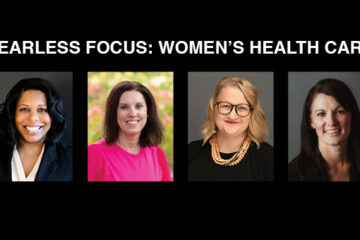The Beacon expands its mission of assisting women to those who’ve just been arrested
It’s still dark outside when women from the Beacon retrieve bicycles parked at the front of the building or set out for the bus stop, ready to pedal or ride to their jobs that morning and, hopefully, into new lives.
The staff at the Beacon sees the effects of complex trauma daily. Among its services, the nonprofit in Des Moines works with women trying to construct new lives after leaving prison – about 85% of clients come after being released from the Iowa Correctional Institution for Women in Mitchellville.
This fall, an effort is ramping up to help women at the other end of the criminal justice process, after they are arrested but before they spend months in jail and receive a possible prison sentence. Rather than going to jail, some women can go right to the Beacon.
The Beacon’s main building is located on a quiet corner in the Sherman Hill neighborhood in Des Moines. In the autumn, the neighborhood is illuminated by fall foliage. Hand-decorated pumpkins dot the path to the entrance.
For many of the women who live there, it’s the first home where they have felt safe.
New approach with diverting women to the Beacon
As a society, we are still learning about the full biological effects of severe childhood trauma.
People who have a high ACES (Adverse Childhood Experiences) score are at much greater risk of health complications down the road – heart disease, cancer, diabetes, depression, anxiety, obesity and more, according to the Centers for Disease Control and Prevention.
They’re more likely to die young. They’re more likely to be victims of crimes. They’re more likely to be incarcerated.
Traumatic stress in childhood can lead to brain changes in adulthood, research has found. For many childhood abuse survivors, succeeding as adults is not as simple as pulling themselves up by their bootstraps. They need a support network. They need therapy. They need more.
The staff of the Beacon social services agency said they strive to treat every woman who comes in the door as an individual. Too much of society instead reflexively judges women who are at risk of homelessness because of domestic abuse, substance use or incarceration, Beacon employees said.
“Right now, it’s viewed as, ‘Oh, you got incarcerated: You’re a bad person,’ instead of, ‘This whole system is unfair. And you were set up to fail,’” said Alexandria Atal, lead case manager at the Beacon.
The new approach with diverting women to the Beacon could mean better outcomes for women. But another selling point the Beacon is emphasizing is that its services cost about $26 a day, versus over $100 of daily expenses at the Polk County Jail.
“Our prison system has become a mental health institution, a substance use treatment facility, and it does a really bad job of those,” said Melissa Vine, the Beacon’s executive director. “This jail diversion poses the question, what would it look like to offer support instead of punishment for people with a lifetime of complex trauma?”
The Beacon can provide a rehabilitation environment where women have jobs and are part of the community. Sometimes, they are able to parent their children, Vine said. The concept has the support of Michael Huppert, chief judge of the judicial district that includes Polk County, Vine said.
Atal said that, at this early stage, she is examining arrest records to look for candidates who might succeed with the Beacon’s services. If they move forward, the Beacon’s goal is to be able to demonstrate to a judge that the best chance for a new trajectory in life is a sentence of probation, conditioned on continuing to take advantage of the Beacon’s services.
Leaders at the Beacon said one of their long-term goals is to have an office located within the Polk County Jail. But that would require more staff and resources than they have currently.
A client’s experience: From ‘constant fear’ to helping others
Marlena Hemphill, 44, is a case manager for the Beacon. She is also a graduate of its programming – an example of a woman setting a new path.
She said both her parents were alcoholics. She watched her father abuse her mother.
“I lived in constant fear,” she said. She started drinking heavily and dropped out of school in sixth grade. Her parents divorced when Hemphill was 13; her mother died a couple of years later and her father was soon out of her life. Hemphill’s oldest child was born when she was 17.
She served time in prison twice for multiple OWI convictions. After her second sentence was over, she had nowhere to go upon her release. She was accepted to go to the Beacon.
“The minute I walked in the door, I knew I was in the right spot,” she said. “That was the first time in my life somebody asked me how I was. … ‘What happened to you?’ rather than ‘What’s wrong with you?’”
Completing the Beacon’s programming wasn’t easy, she said. It involved working on childhood trauma and developing skills that were neglected when she was in a day-to-day survival mode.
“I’m at that acceptance stage,” she said. “Yeah, all those things happened to me. But it’s OK. I can relate with my dad. He did the best that he could, given his circumstances growing up.” Breaking generational trauma is hard, she said.
She reconnected with her son, now a Des Moines police officer, after he was sent to the Beacon to answer a call.
She started as a case manager Nov. 6 after working in other roles at the Beacon.
“The Beacon is different from everywhere else because we really do treat these women like individuals,” she said.
Jail-diversion effort recognizes trauma that leads women to incarceration
Vine and Atal said that the vision for jail diversion won’t be achieved overnight. The criminal justice system’s processes have been entrenched for decades upon decades. And, among other obstacles, the fact that people are being booked at Polk County Jail around the clock could eventually mean new around-the-clock duties for the Beacon’s staff.
“Our goal is to go in, get our feet wet, and then just change the system,” Atal said.
Vine said women at the Beacon typically have suffered trauma since childhood and expend most of their effort on such things as surviving, finding meals and protecting siblings from violence. When they become adults, they might get low-wage jobs and experience domestic violence – a tragically familiar situation. Those paths often lead to homelessness and substance addiction.
“In my mind, these women are not addicts or criminals,” Vine said. “These are women who are hurting and looking to survive. But what happens is, the United States has built a prison system that exploits people like this.”
Seventy percent of children who have one incarcerated parent will be incarcerated themselves later in life, Vine said. “So this is a compounding problem.”
“After I had been at the Beacon for about a year, I started asking the question, ‘What would it look like to offer support instead of punishment to these women?’” Vine said.
Conditions for employees, including wages, are important, too
The principle of respect extends beyond clients. Vine said the Beacon is conscious about providing good conditions for its employees.
“The old-school nonprofit model is overworked, underpaid,” Vine said. “So I don’t work more than 40 hours a week. Because if I did, that would communicate to my staff that that’s the expectation I have of them.”
Just as important are wages, Vine said.
“When I got to the Beacon, people were making $10 an hour, and I said, ‘How are we an organization that’s helping women get out of poverty while simultaneously keeping them in poverty with these wages?’ That’s what a lot of nonprofits do. Are you paying people a livable wage? Because otherwise, you’re keeping people in the system that you’re supposed to be trying to eradicate. That doesn’t make sense.”
A recent job posted by the Beacon for a full-time resident assistant who works afternoons, evenings and weekends starts at $18 per hour, plus “100% covered medical insurance, three weeks PTO and a matching 401K.”
Atal said she felt appreciated when she was promoted after six months at the Beacon in recognition of what she had been accomplishing: “Any other nonprofit would be, like, ‘Great. We have this employee that’s doing this stuff already. Let her keep doing that.’ And instead I was pulled over and, ‘OK, you’re doing extra stuff. Let’s actually make a title for that and compensate you.’”
‘Our highest value is dignity’
Vine said the Beacon’s revenue is about 35% fundraising, 45% grants and 20% rent paid by clients. The Sherman Hill facility has 34 beds, but Vine said the agency wants to move toward more single-family rooms or units instead of congregate housing, in line with current research on what is best. Other locations will offer different types of service.
Atal said giving clients autonomy and respect lets the staff insist on accountability and makes it possible to have difficult conversations with women. That leads to success stories like Hemphill’s – about 40% of the Beacon’s workers are program graduates.
“Our highest value is dignity,” Vine said. “And that’s the feedback we get from our clients the most: ‘This is the first time in my life that I was treated with dignity.’”


